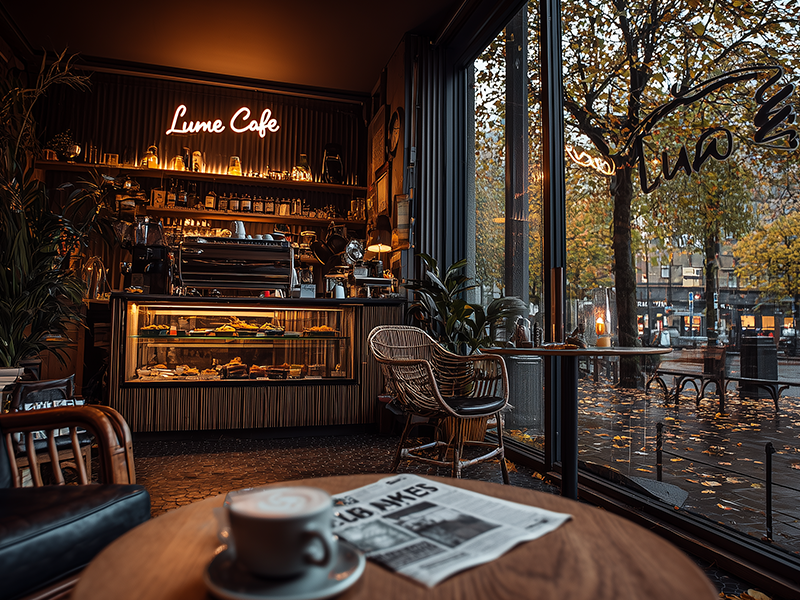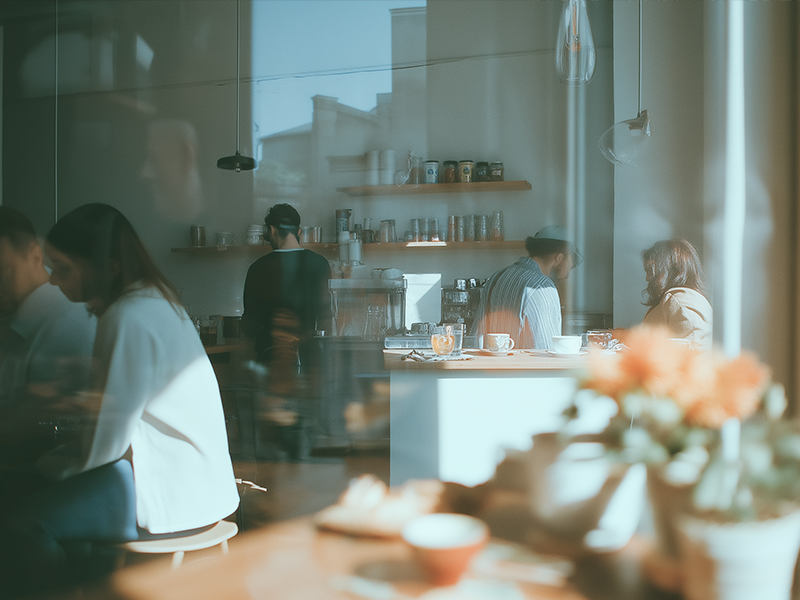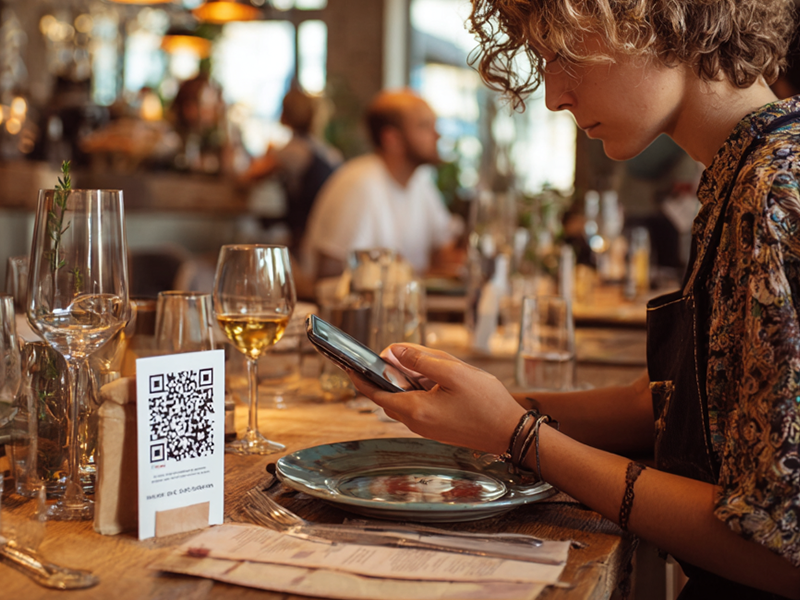Three years ago, I watched a local coffee shop owner count the same five customers walking through his door every morning. Same faces, same orders, same predictable $47 daily revenue. He asked me the question I hear from café owners weekly: "How do I get people to come back more than once?"
The answer isn't another punch card collecting dust in someone's wallet. Smart café owners are building customer loyalty programs that turn occasional visitors into daily regulars, and I've seen the numbers to prove it works.
Why Most Café Loyalty Programs Fail (And Yours Doesn't Have To)
Here's what doesn't work: generic "buy 10 coffees, get one free" cards that customers lose, forget, or frankly, couldn't care less about. I've audited hundreds of restaurant and café loyalty programs, and the failures always share the same problems.
The biggest mistake? Treating loyalty programs like a discount strategy instead of a relationship-building tool. Your customers don't need cheaper coffee. They need reasons to choose your café over the Starbucks across the street, the trendy new coffee shop downtown, or that cozy breakfast spot with the amazing loyalty perks.
Real customer loyalty programs for cafés work because they solve three core problems every independent café owner faces: unpredictable foot traffic, low customer lifetime value, and fierce competition from coffee chains.
The Psychology Behind Café Customer Loyalty (It's Not About Free Coffee)
Before we dive into program mechanics, let's talk about why people actually become loyal café customers. After working with dozens of coffee shops, restaurants, and bars, I've noticed something fascinating.
Regular café customers aren't just buying coffee. They're buying consistency, community, and convenience. The accountant who stops by every Tuesday isn't just addicted to your cold brew. She's created a routine that includes your café as a reliable, pleasant part of her week.
This is why the most successful customer loyalty programs I've implemented focus on enhancing these three elements rather than just offering discounts. When a loyalty program makes someone's café experience more consistent, social, or convenient, they'll choose your business over competitors every time.

5 Loyalty Program Types That Drive Real Results for Cafés
1. Points-Based Rewards (The Foundation)
Every dollar spent earns points. Simple math, predictable rewards. But here's where most cafés get it wrong: they make the math too complicated or the rewards too distant.
What works: 1 point per dollar spent, 100 points equals $10 reward. Customers can track their progress easily, and the reward feels achievable after 2-3 visits instead of requiring 15 visits over six months.
Pro tip from my consulting days: Add bonus point opportunities for specific behaviors. Double points on weekdays before 9 AM helps smooth out rush hour chaos. Triple points for trying new menu items drives sales of higher-margin specialty drinks.
2. Tiered VIP Programs
This is where customer loyalty programs get interesting. Create membership levels based on annual spending: Bronze (under $200), Silver ($200-500), Gold ($500+). Each tier unlocks better perks.
Gold members might get free pastries on their birthday month, exclusive access to new seasonal drinks, or priority ordering during busy periods. I've seen café owners use Gold tier perks to create genuine VIP experiences that customers brag about on social media.
3. Subscription-Style Loyalty
Monthly unlimited coffee subscriptions are exploding in popularity, especially among remote workers and students. For $75-125 per month, customers get unlimited basic drinks (with limits on premium additions).
One café owner I advised saw his subscription program generate 40% of monthly revenue within eight months. The predictable income helped him expand hours and hire better staff, which improved service for all customers.
4. Social Loyalty Programs
Reward customers for Instagram posts, check-ins, and referrals. This turns your loyalty program into a marketing engine that builds your local visibility while rewarding customer behavior.
Reality check: Don't go overboard here. Offer points for social actions, but make sure the primary value comes from actual purchases. Nobody wants their coffee shop's loyalty program to feel like a social media assignment.
5. Community-Based Rewards
Partner with local businesses to create cross-promotional loyalty benefits. Coffee shop customers earn rewards at the nearby bookstore, yoga studio, or breakfast restaurant. This builds local business relationships while giving customers more reasons to stay loyal.

How to Design Your Café's Loyalty Program (Step-by-Step)
Step 1: Know Your Customer Patterns
Before launching any customer loyalty program, spend two weeks tracking basic customer data. How often do regulars visit? What's their average spend? Which menu items drive repeat visits?
I always tell café owners to start with their existing regulars. Design a program that rewards the behavior you already see from your best customers, then expand from there.
Step 2: Choose Your Technology Platform
For most independent cafés, I recommend starting simple. Square Loyalty integrates with most POS systems and handles the technical complexity. Toast also offers solid loyalty features for restaurants and cafés.
Avoid building custom apps unless you're running multiple locations. Customers already have enough apps on their phones, and maintenance costs add up quickly for small businesses.
Step 3: Set Your Reward Structure
The golden rule: rewards should cost you 8-12% of program revenue. If customers spend $1000 through your loyalty program, your reward costs should be $80-120.
Price your rewards to encourage higher-value purchases. Instead of just offering free coffee, create rewards for premium drinks, food items, or bundled purchases that increase average transaction value.
Step 4: Plan Your Launch Strategy
Don't just flip a switch and hope customers notice. Plan a two-week soft launch with existing regulars, gather feedback, then do a bigger announcement on social media and Google Business Profile.
Launch week tip: Offer double points or bonus rewards for the first 100 sign-ups. This creates urgency and helps you reach critical mass faster.
Common Loyalty Program Mistakes That Kill Café Revenue
Mistake #1: Making It Too Complicated If customers need a flowchart to understand your rewards, simplify immediately. Confusion kills participation.
Mistake #2: Rewards That Don't Match Customer Preferences I've seen cafés offer free pastries to customers who only drink black coffee, or merchandise rewards to customers who clearly just want food discounts. Pay attention to what your regulars actually order.
Mistake #3: No Promotion Strategy Building a great loyalty program means nothing if customers don't know it exists. Budget 15-20% of your monthly marketing spend on promoting your loyalty program through Google Ads, social media, and in-store signage.
Mistake #4: Forgetting About Data Your loyalty program should generate customer insights that improve your business. Which rewards drive the most repeat visits? What purchase patterns predict long-term loyalty? Use this data to optimize your menu, staffing, and inventory.
How Loyalty Programs Boost Your Local SEO and Google Rankings
Here's something most café owners miss: customer loyalty programs directly impact your local search visibility. When customers visit more frequently, they're more likely to leave Google reviews, share location check-ins, and search for your business by name.
Google loves consistent customer behavior signals. Higher visit frequency, longer dwell times, and repeat customer searches all signal to Google that your café provides valuable local experiences worth ranking higher in "coffee near me" searches.
Your loyalty program data also helps you create better Google Business Profile posts, social media content, and local SEO strategies based on actual customer preferences rather than guesswork.
Measuring Loyalty Program Success: KPIs That Matter
Track these metrics monthly to evaluate your customer loyalty program performance:
Customer Retention Rate: Percentage of customers who make repeat purchases within 30 days Average Visit Frequency: How often loyalty members visit compared to non-members
Customer Lifetime Value: Total revenue per customer over 12 months Program Participation Rate: Percentage of customers who join your loyalty program Reward Redemption Rate: How often customers actually use their earned rewards
The last metric is crucial. Low redemption rates usually mean rewards aren't appealing enough or the process is too complicated.
Advanced Loyalty Strategies for Growing Cafés
Once your basic loyalty program runs smoothly, consider these advanced strategies I've tested with established coffee shops and restaurants:
Seasonal Challenges: "Drink 5 different seasonal lattes in October, unlock exclusive November rewards." Creates urgency and drives trial of new menu items.
Community Events: Loyalty member-only tastings, early access to new menu items, or reserved seating during busy periods. These perks cost almost nothing but create genuine exclusivity.
Personalized Offers: Use purchase history to send targeted rewards. If someone always orders oat milk lattes, send them double points on oat milk drinks when you're trying to move inventory.

The Future of Café Loyalty: AI and Personalization
Customer loyalty programs are getting smarter. Within the next two years, I expect most successful cafés will use AI-powered systems that automatically adjust rewards based on individual customer behavior.
What this means for café owners: Start collecting detailed customer preference data now. The more you know about individual customer habits, the better you can personalize their loyalty experience as technology improves.
Smart café owners are already preparing for voice search and AI-powered local recommendations. When someone asks Siri or ChatGPT for "the best coffee shop with loyalty rewards near me," your business needs the right signals to appear in those results.
Making Your Loyalty Program Work in Today's Market
Customer loyalty programs aren't just nice-to-have perks anymore. They're essential competitive tools for independent cafés competing against chains with massive marketing budgets and mobile apps.
The bottom line: A well-designed loyalty program turns your café into a habit rather than a choice. When customers earn rewards for visiting your business, they have concrete reasons to choose you over competitors, even when those competitors are more convenient or slightly cheaper.
Start simple, measure everything, and adjust based on actual customer behavior rather than assumptions. The café owners winning in today's market aren't necessarily serving the best coffee. They're building the strongest customer relationships, and loyalty programs are their secret weapon.

-p-500.jpeg)
